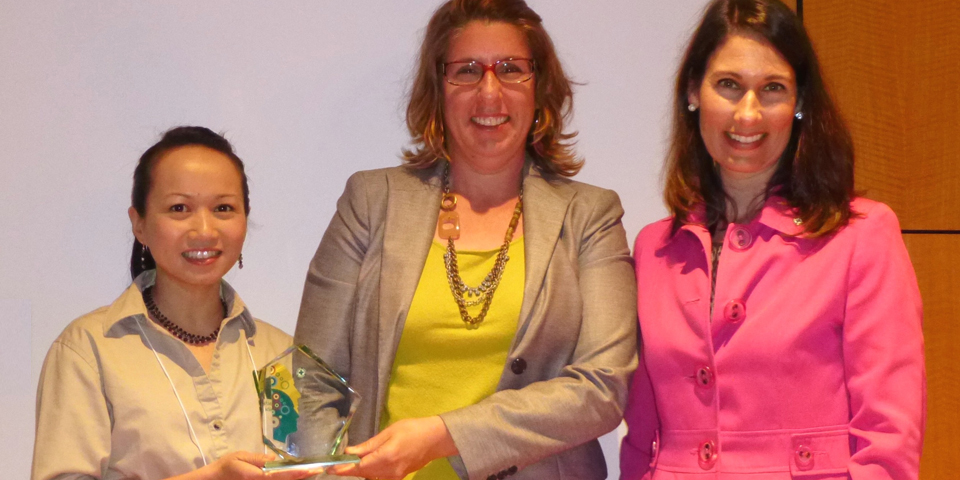The National Farm Medicine Center (NFMC), Migrant Clinicians Network (MCN) and four partner organizations received the inaugural Stakeholder Collaboration in Occupational Injury Research Award, sponsored by the National Safety Council (NSC).
The award was presented May 19 as part of the National Occupational Injury Research Symposium (NOIRS) 2015 in Kingwood, West Virginia. The award recognizes broad stakeholder collaborative efforts in the Seguridad en las Lecherías: Immigrant Dairy Worker Health and Safety Project, being conducted in Wisconsin.
Iris Anne Reyes, National Farm Medicine Center (left) and Amy Liebman, Migrant Clinicians Network (middle) accept the Stakeholder Collaboration in Occupational Injury Research Award, presented May 19 by National Safety Council President and CEO Deborah Hersman at the National Occupational Injury Research Symposium 2015 in Kingwood, West Virginia.
“Dairy workers have a high rate of occupational injury,” said Amy Liebman, co-director for the project and director of environmental and occupational health at MCN. “The Seguridad project shows that for a huge problem like work-related health and safety on dairy farms, collaboration between workers, producers, researchers, and health and safety practitioners is an effective approach to ensure worker protection.”
Liebman and NFMC Project Coordinator Iris Anne Reyes accepted the award on behalf of the project team, which is led by NFMC Director Matthew Keifer, M.D., and includes NFMC’s Yurany Ninco Sanchez, community outreach trainer. NFMC is part of Marshfield Clinic Research Foundation (MCRF).
Partner organizations included: Professional Dairy Producers of Wisconsin; the Consulate of Mexico in Saint Paul, Minnesota; the University of Wisconsin-River Falls; and Wisconsin nonprofit Puentes/Bridges.
Agriculture lacks many worker health and safety regulations found in other industries. An increasing number of immigrants with limited experience, unaddressed safety training needs, and language barriers are hired to work in dairy. Few resources are geared for this population and farmers lack the safety, language, and cultural knowledge to train these workers in health and safety.
The Seguridad project tests culturally-appropriate popular education approaches and the promotor de salud, or community health worker model, to provide health and safety training to immigrant dairy workers in Wisconsin. In the promotor model, lay people are trained to educate their peers.
To date, the Seguridad project has partnered with 54 farms throughout Wisconsin, training 737 workers and 37 promotores, totaling over 2,639 training hours. This effort has resulted in a demonstrated increase in health and safety knowledge among participating dairy workers.
“The community health worker model engages workers in helping to solve health and safety issues on the farm and creates an important opportunity for worker-management interaction, while bridging cultural and language barriers,” Dr. Keifer said. “We are testing to see if it has measurable impact on health and safety on dairy farms – and so far, our data suggest that it does.”
The awarding entity, National Safety Council, is a nonprofit organization with the mission to save lives by preventing injuries and deaths.
“Working together gives us the greatest opportunity to save lives and prevent injuries,” said Deborah Hersman, president and CEO of the National Safety Council. “NSC is excited to present the inaugural Stakeholder Collaboration in Occupational Injury Research Award to the National Farm Medicine Center, Migrant Clinicians Network and their partners. Their collaborative efforts to reach a population of workers in dire need of attention set them apart from other nominees.”
The project is supported by the Upper Midwest Agricultural Safety and Health Center (UMASH), a center funded by the National Institute for Occupational Safety and Health.
“We are thrilled for the Farm Center and its partners,” said Robert Steiner, M.D., MCRF executive director. “The type of research being done in the Seguridad project puts the NFMC/UMASH team in close contact with the community they are serving, and is making dairy farms safer places to work.”



